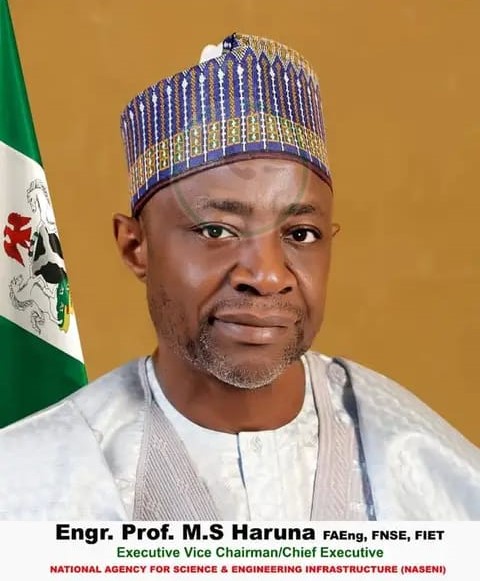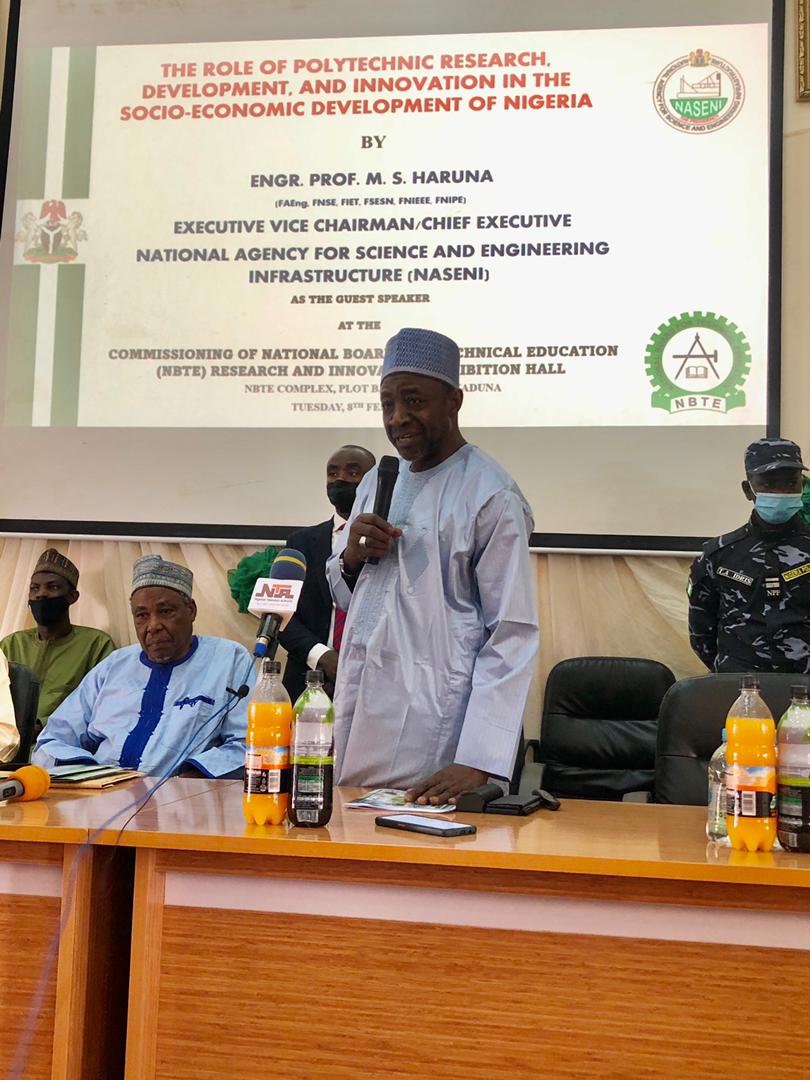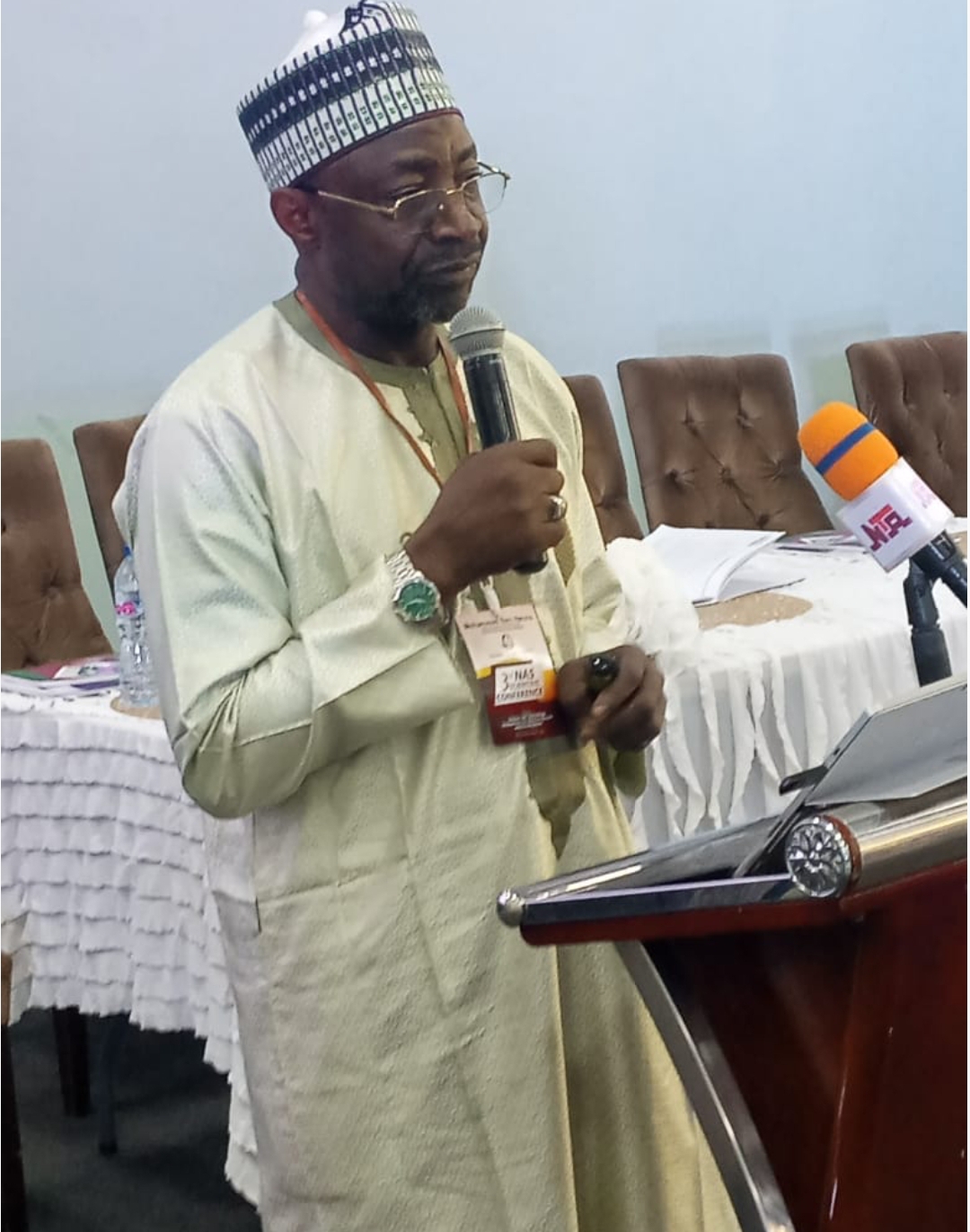Tag: PROF. HARUNA
-

Prof. Haruna bags business day excellence in public service award 2021
The Business DAY newspaper has recognised the outstanding performance of the Executive Vice Chairman/Chief Executive of the National Agency for Science and Engineering Infrastructure(NASENI), Engr.Prof. Mohammed Sani Haruna amongst over 100 Ministries, Departments and Agencies (MDAs) of Government assessed by a special panel set up by the newspaper.The Excellence in Public Service Awards is an annual recognition event that celebrates functionaries occupying strategic positions in the federal administration, who in the performance of their responsibilities, embody the best values of responsible policy formulation, operational delivery of excellence, and broad stakeholder.The awards are open to federal MDAs. The 2022 edition of the prestigious Excellence Awards-giving ceremony, which is 4th in the series, had 2021 activities of the MDAs in focus with the judges considering the respective remarkable successes achieved in fulfilment of the institutions mandates.The panel also considered the individual institution’s means employed to deliver the mandate such as stakeholder coalition-building and sustainability considerations.According to Business Day Panel’s assessment in year 2021, NASENI under Prof. Haruna’s leadership recorded impeccable achievements in areas of inventions, innovations and products development through multi-sector interventions.The verdict of the judges was that the Executive Vice Chairman of NASENI distinguished himself as an administrator per excellence through the various innovations introduced to NASENI.Because of the leadership by Prof. Haruna, NASENI rose from an obscure agency in the Federal Ministry of Science and Technology to an agency that has contributed immensely to national development.The Business Day also affirmed that due to the activities of its leader, NASENI has contributed to the development of local content in the critical areas of education, agriculture, water and health, aviation and transport sectors of the economy.Notable also among several achievements of the EVC/CE was the research and fabrication in 2019 of the equipment(disinfectant sprayers) used in the fight against COVID-19 pandemic, the initiation of the 1st Made-in-Nigeria helicopter, E-voting Solution, Smart Prepaid Energy Metre(SPEM) and many more.Prof Haruna received the Excellence in Public Service Award amidst other winners like the Honourable Minister of Interior, Ogbeni Rauf Aregbesola, Managing Director/CEO, National Inland WaterwaysAuthority(NIWA),Dr.George N.Moghalu, Managing Director, North East Development Commission(NEDC), Mohammed Alkali, Chairman/Chief Executive National Drug Law Enforcement Agency(NDLEA) Rtd. Brig.Gen.Buba Marwa, Federal Commissioner National Commission for Refugees, Migrants and Internally Displaced Persons(IDPs) Imaan Sulaiman-Ibrahim. Others include: Executive Director,Rural Electricfication Funds(REF) Dr. Sanusi Mohammed Ohiare, Commissioner for Insurance, National Insurance Commission(NAICOM) Mr.Sunday Oludare Thomas and The Permanent Secretary, State House, Presidential Villa, Abuja, Mr.Tijani Idris Umar. -

“TVET As Veritable Tool for Academic and Industrial Linkages” – Prof Haruna.
Technical and Vocational Education Training (TVET) has been described as a veritable instrument in linking industries, Academia and technological advancements for promotion of Research and Development (R&Ds) for the growth of the nation’s economy.The Executive Vice Chairman/Chief Executive of the National Agency for Science and Engineering Infrastructure (NASENI), Engr. Prof. Mohammed Sani Haruna who was the Special Guest at the commissioning of National Board for Technical Education (NBTE) R&Ds and Innovation Exhibition Hall disclosed this on Tuesday in Kaduna while presenting his paper titled: “The Role of Polytechnic Research, Development and Innovation in the socio-economic Development of Nigeria”.While emphasizing the importance of Technical and Vocational Education and Training (TVET) in the socio-economic development of any nation, Prof. Haruna said “the foundation of a knowledge-based economy is formed on a tripod comprising of technicians (Crafts men and women), Technologists and Engineers, who must work together in ensuring Nigeria’s transition from consumer based economy to a manufacturing economy”“Technical and Vocational Education and Training (TVET) have been recognized as instrumental toward making extraordinary contributions to industries and technological work environments.Prof.Haruna said that “Developed and developing countries such as China, USA, Japan, Singapore, Germany and the Asian Tiger Clubs had attained tremendous heights in terms of industrialization resulting from consistent and substantial investments in TVET in all economic ramifications for their citizens”.Prof. Haruna noted that NASENI, as an Agency of Federal Government with the primary target to empower Small and Medium Scale Enterprises (SMEs) through impartation of technologies, engineering principles and practices for the production of equipment that will meet international standards as well as sustenance of a flourishing local capital goods or industry, is willing to partner with NBTE and Polytechnics in the development of a pilot plant on promising R&Ds and Innovation Prototype.Haruna, a Professor of Electrical Engineering himself is an alumnus of both Plateau State Polytechnic Barkin Ladi and Kaduna Polytechnic shared his experience on the glorious days when polytechnics were known to produce relevant and quality graduates who were highly sort after by employers of labour from the private sector and various industries as well as the mutually beneficial synergy and collaboration that existed between industries and polytechnics. This he said “is now completely history”He, however, called on NBTE to review the operation of double stream classes called consultancy classes whereby student of polytechnics were admitted for afternoon and evening classes only. A method he said was lowering the standard and quality of polytechnic graduates.Prof. Haruna concluded his address by congratulating NBTE for technology promotion through the commissioning of a Research, Development and Innovation Exhibition Hall for the TVET Sector and he emphasized NASENI’s willingness to partner with NBTE and any polytechnic with a promising prototype of research output to develop a pilot plant as well as investment in joint ventures with private sector for commercial production.The Highlight of the event was the commissioning and inspection of the Exhibition Hall by the Chairman of the occasion, Engr. Musa D. Abdullahi alongside NBTE Executive Secretary, Prof. Idris M. Bugaje, NASENI’s EVC/CE, Engr. Prof. M. S. Haruna and other stakeholders present. -

Prof. Haruna unravels need for integration of innovation, science and technology for Nigeria’s development
It was a moment for sober reflections at the opening ceremony of on-going Nigerian Academy of Science (NAS) conference in Abuja as the Executive Vice Chairman/CE of the National Agency for Science and Engineering Infrastructure(NASENI), Professor Mohammed Haruna laid bare in simple way the historic workings and various intervention phases by science, innovation and technologies sector in building the advanced economies of countries in Europe, America and Asia which had led to enviable socio-economic well-being of citizens in those countries while Africa in spite of abundant human and material resources remained perpetual consumers of obsolete technologies, perennial poverty and downward economic trends.
Prof. Haruna was keynote speaker at the 3rd NAS Annual Scientific Conference in Abuja which began on Tuesday 25th January, 2022 at the Nigerian Airforce Conference Centre located in Federal Capital Territory.
The NASENI’s Executive Vice Chairman while explaining reasons for continued widening of gaps between economic performance and socio-economic wellbeing of citizens in the advanced world and incidences of poverty and general underdevelopments in most African countries including Nigeria said that “developments in cutting edge technologies better known as frontier technologies have shown tendencies to widen the socio-economic gaps between the advanced and developing nations in one hand; and between the third world and developing countries on the other. Such technologies according to NASENI boss included Artificial Intelligence(AI); Robotics; the Internet of Things(IOT); Big Data; Block Chain; Additive Manufacturing (3D Printing); Autonomous Vehicles; Unmanned Aerial Vehicles(UAV); Gene Editing; 5G Network and the recent innovation of high-efficient solar cell that can produce a thousand times more power than the silicon based solar cells”
Further in his address to the gathering called best minds in the Nigerian scientific community, the NASENI’s Executive Vice Chairman put the scientists to tasks on the need for their responses to the present Nigeria economic challenges, saying: “Nigeria is yet to be prepared to catch the on-going technological wave to imitate, copy, use, adopt and adapt to the current Fourth Global Industrial revolution despite obvious opportunities and high potentials for sustainable development brought about by all the elements of economic transformation listed above.
Haruna, a Professor of Electrical Engineering said Nigeria currently risks being perpetually at the receiving end of increasing inequalities between her and the developed world including being trapped in the escalating new digital divides now existing between “the technology have nations and the technology have nots” the latter is where most African countries belong except South Africa.
Nigeria is a blessed country no doubts, he said. But the Covid-19 pandemic according to Prof. Haruna has further exposed the weaknesses of the third world nations the same pandemic which rather motivated some developing and developed countries to take advantage of subsequent global economic meltdown to transit much faster and earlier into the next industrial revolution thus expanding the Science, Technology and Innovation (STI) dichotomy.
His words: “Nigeria is a country so blessed with abundant natural resources; large population; talents; large geographical and suitable location as well as most friendly climate but still imports food, other consumables including by-products of crude oil. Myself as one of those saddled with the responsibilities of implementing strategic STI policies appropriate to our country’s predicament, I am pained that foreign technologies and equipment in our mobile telecommunication; online banking services; Integrated Personnel Payroll Information System (IPPIS); Government Integrated Financial Management Information System (GIFMIS); Remita payment platform; 2G to 4G and now 5G broadband deployment dominate our economy”
The question is what inputs and ownership of manufacturing and or the technologies behind the above list belong to Nigerians or Africa? The answer is none. (sad).
The implication of this scenario to our development, according to Haruna, is that the present and future generation of Nigerians will remain consumers of imported products. The lack of domestic endogenous capability and capacity to produce modern technologies and competitive industrial goods and services in Nigeria’s economy is fueling frightening poverty, joblessness and insecurity in Nigeria. Wealth creation, peace, progress and stability are bye products of knowledge-based economy and not commodity or raw material oriented and import dependent economy.
The keynote paper however brought out hopes by illustrating some of the achievements of NASENI under Prof. Haruna which included various NASENI home-grown interventions in power, Agriculture, Education, Health and industrial sectors in Nigeria and with the funding coming in other sectors and many more will be immensely boosted. The Agency with the available resources had invested in human capacity development and also achieved a long list of scientific and technological breakthroughs leading into manufacturing of kinetic turbine, pre-paid meters, laboratory equipment and unmanned Aerial drones and other technological innovations based on research and development from NASENI. The Agency also intervened in producing 3-D masks, ventilators and environment disinfectants for the COVID-19 including the design and production locally electronic voting solution and currently working on locally produced jet engines and production of military hard-wares amongst other things.
Professor Haruna concluded his address that “only home-grown solutions rooted in massive soft and hard STI infrastructure can rescue Nigeria and also Africa generally, from the current vicissitude. He recommended that it is only in building domestic endogenous capacity for Science and Technology in Nigeria, in particular, the capacity for Research and Development; Engineering design and fabrication; Technology Production; Technology Innovation and Industrial production that can solve security challenges, alleviate poverty and all other socio-economic problems bedeviling our nation”
His last counsel in the keynote address were that “Nigeria must strive to establish and sustain the culture of competitive industrial economy that can produce and manufacture modern technologies and globally competitive industrial goods in Nigeria using enabling home-grown Science and Technology Innovation (STI) procedures”